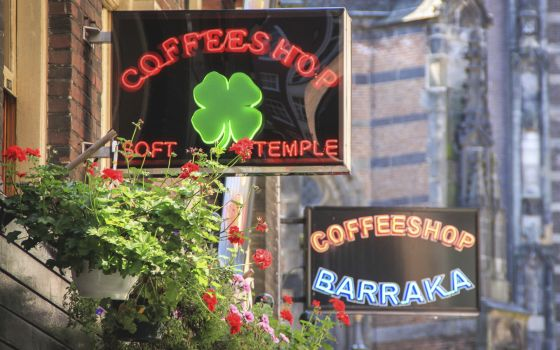Amsterdam Flooded with Artificially Flavored Marijuana
Amsterdam’s coffeeshops are under increasing pressure from new, absurd laws that restrict both consumers and sellers of marijuana. For example, in 2016, the Netherlands passed a law requiring coffeeshops to be located a certain distance away from educational institutions. In addition, city authorities are pushing coffeeshops to strictly enforce the Europe-wide ban on tobacco smoking in public places. The ban only applies to tobacco, not marijuana, but since it’s difficult for shop owners to monitor customers who like to mix the two, many establishments have simply banned all smoking on their premises. Only a few shops have been able to set up special areas for tobacco smoking. The rest, usually operating in small spaces, are now non-smoking zones.
The Death of Coffeeshops?
Due to various restrictions, the number of marijuana shops in Amsterdam has dropped significantly, while those that remain open are often overcrowded. As a result, some shops have started requiring customers to purchase buds or hash before being served coffee or other services, which itself violates established rules. Legally, a coffeeshop is considered a café that sells both coffee and marijuana. Forcing customers to buy marijuana, which is still considered an illegal drug in the Netherlands, is against the law.
The lack of competition has led to a decline in service quality, which is already deterring some tourists from visiting Amsterdam’s coffeeshops. After all, what kind of service can you expect when you’re almost a monopoly? By the end of 2018, another 31 cafés are set to close, further monopolizing the marijuana market. Despite the closures, marijuana consumption levels have remained the same, so the few remaining cafés are making much higher profits than before. On top of that, some greedy business owners, clearly aware of their newfound monopoly, have started selling artificially flavored marijuana to customers instead of high-quality strains.
Marijuana That Smells Like Condoms
According to Hanf magazine editor “Mr. Kimo,” marijuana he purchased at several major Amsterdam coffeeshops had a strange, unnatural fruity aroma.
“Famous aromatic strains like ‘Strawberry Cough’ and ‘Lemon Haze’ should have subtle fruity notes. But the bag of marijuana I bought at the well-known café ‘XXX’ reeked like a pack of condoms mixed with synthetic fragrances. I definitely wouldn’t waste my money on such a ‘surprise.’ As if terrible hybrids like ‘Strawberry Banana Kush’ weren’t bad enough. Not only did the shop’s marijuana smell awful, but it was also damp, making it burn very poorly. I didn’t even try this ‘suspicious substance.’ I only kept the bag to photograph this horror. After a few hours, the wet, smelly green mess started to rot—the bag began to smell like a mix of moldy fruit, so strong that it was hard to breathe in the room. It was like leaving a salad out in the sun and then opening it. The smell was disgusting.”
This is how a well-known grower and editor from Amsterdam described store-bought marijuana last March. When Mr. Kimo returned to shop “X” to ask about the poor quality, the person behind the counter refused to answer and asked him to leave. Further investigation revealed that in the Oud Kerk area, several shops were selling similar marijuana to tourists. At least four well-known coffeeshops are involved in this practice. Visitors to Amsterdam are also advised to avoid marijuana labeled “Vanilla Kush” and “Blueberry.”
Marijuana Banned by the Marijuana College
The independent information center for marijuana enthusiasts, known as the Marijuana College, also learned about artificially flavored buds. Now, a security guard has been stationed next to the center’s public vaporizer, which all visitors can use, to ensure that artificially flavored marijuana isn’t consumed with the equipment. There’s even a sign next to it that reads:
“Consumption of marijuana with apple or strawberry flavoring is prohibited!”
An organization that supports marijuana use asking people not to smoke it? That’s a clear sign that, while there’s still time, Amsterdam’s coffeeshops need to return to an open market, proper product quality, consumer protection, and fair competition. Right now, Amsterdam’s marijuana market is controlled by a handful of politicians and monopoly business owners, which is causing the decline in marijuana quality. Unfortunately, ordinary consumers and honest entrepreneurs have no way to resist the arrogant monopolists and bureaucrats. Authorities don’t seem to see a problem with adding foreign chemicals to marijuana. Workers and owners of other cafés can’t challenge the unfair practices of their monopolist neighbors, since they themselves operate in a legal “gray zone.” The average consumer, unprotected by law, is forced either to stop visiting coffeeshops or to get used to adulterated products.
In the end, the Netherlands’ much-praised tolerance policy has become as moldy as the marijuana on store shelves. In reality, it was never meant to protect fair competition and consumers, who are still seen as semi-criminals in the eyes of Dutch law. It seems the tolerance policy was really only intended to bring in tax revenue and attract tourists, not to create a fair and open marijuana market.



